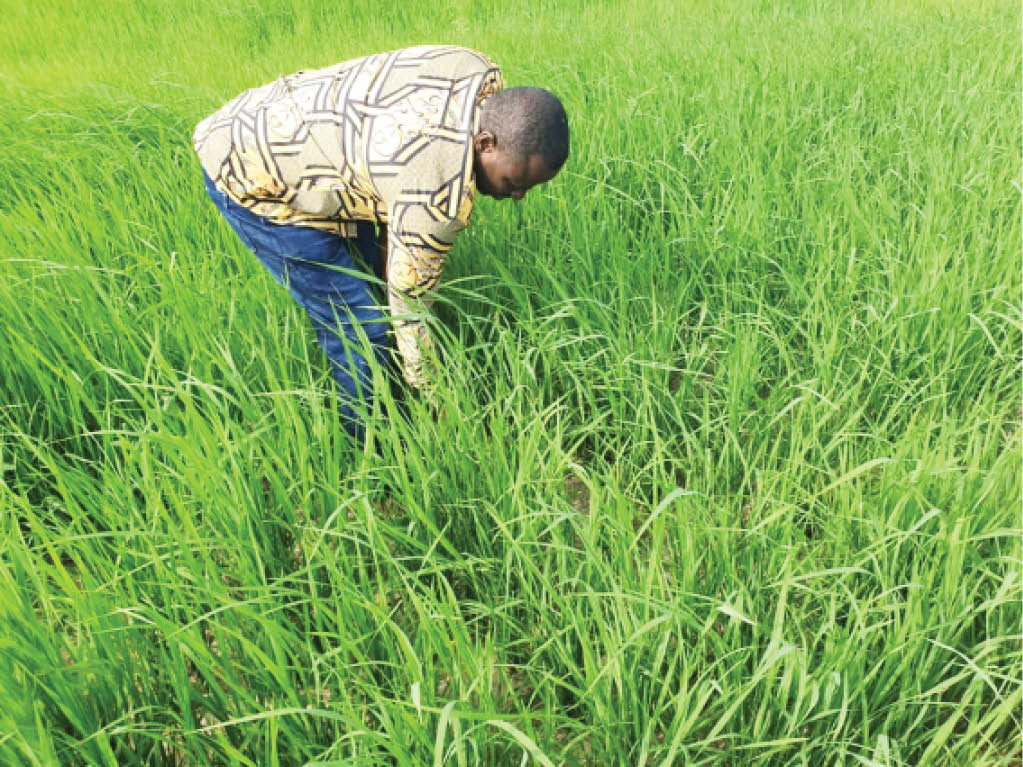Benue rice farmers eye good yields despite huge input costs
Rice farmers in Benue State are expecting a bountiful harvest barely two months after planting. Some of them who spoke to our correspondent in Makurdi expressed optimism that harvest would be due anytime between October and November. Lagos poultry farmers face waste disposal hurdle Why smallholder women farmers must be supported A smallholder farmer in […]

Rice farmers in Benue State are expecting a bountiful harvest barely two months after planting.
Some of them who spoke to our correspondent in Makurdi expressed optimism that harvest would be due anytime between October and November.
Lagos poultry farmers face waste disposal hurdle
Why smallholder women farmers must be supported
A smallholder farmer in Mbatiav-Gboko area of the state, Titus Atondo, said he planted his rice on a two-hectare land in July.
Atondo said he obtained seeds from an open market in his area and they are in two categories of CP and OC rice while he used Dazzle chemical for clearing of land for post-planting as well as 20- 10 – 10 fertilizer.
“The challenges of farming rice in rural environs such as mine are enormous because we rely absolutely on manual labour as tractors can hardly access the farm routes.
“We employ people to work on the farm land from the level of land preparation to harvest. This is tiring and costs a lot,” he said.
Atondo said all monies spent on his farm which is at weeding stage now including planting, clearing, fertiliser application and expected harvest totaling N120,000.
He, however, expects at least 50 bags of paddy as harvest from the two hectares which would likely be sold at the current price of N29,000 per 100kg bag.
Similarly, a big rice farmer, Vitalis Tarnongu, planted his seedlings in June through July on 274 hectares of land which clearing cost stood at N14, 500 per hectare while land preparation costs N25,000 per hectare.
He planted Faro 44 (Supi) and Faro 61 (OC) varieties obtained from the National Agricultural Seeds Council (Foundation seeds) and others were sourced from Olam Nigeria Limited.
“The growth levels at the moment are in different categories while some are in selective weeding stage, others are at premergence herbicide stage as the farm was cultivated in stages,” he added.
Tarnongu further disclosed that the challenges so far include finance as the cost of procuring selective herbicides are expensive and cost of labour increased astronomically.
He said harvest would be expected to commence in October through November, adding that the total cost of production at the end of the day would be a minimum of N246,000 per hectare while expected yield would be three tonnes which may translate to N360,000 at the rate of N120 per kilograms.
Tarnongu does not use chemicals on his rice farm, rather, he advocates and practices organic agriculture, stressing, “Thus, we apply strictly organic herbicides, pesticides (Bionim insecticide) and fertilizers (Bionim and SiSO B).”
The chairman, All Farmers Association of Nigeria (AFAN) in Benue State, Comrade Aondongu Saaku, expressed optimism that the rainfall pattern this year would be favourable for bountiful rice production.
Saaku said more farmers went into rice cultivation late this year basically due to the COVID-19 pandemic lockdown which kept many people away from offices and present at their farms.
He said, “This year harvest will be 20 percent higher than 2019 production valued at more than one million tonnes.”
According to him, enumerators are currently taking statistics of various crop farmers and by the time the exercise is concluded, the number of rice farmers in the state will be ascertained.
Saaku, who said he cultivated only three hectares of rice farm, noted that some farmers planted the long duration rice in June while those cultivating the short duration are still doing so at the moment for harvest expected at the end of November or early December.
The AFAN chairman added that the rice farmers are using systematic chemicals to kill mature grasses, short duration chemicals, fungicides and pesticides.
He expressed concern on the challenge of rodents threatening rice plants, adding however that the farmers were fencing, placing cables around and clearing the edges of farms to tackle the problem.
Saaku emphasised that the challenges were also heightening cost of production because, “We (farmers) hadn’t enough inputs this year. Farmers are managing on their own because government didn’t procure inputs such as fertiliser this year so we depended on private marketers who don’t enable subsidy.”
